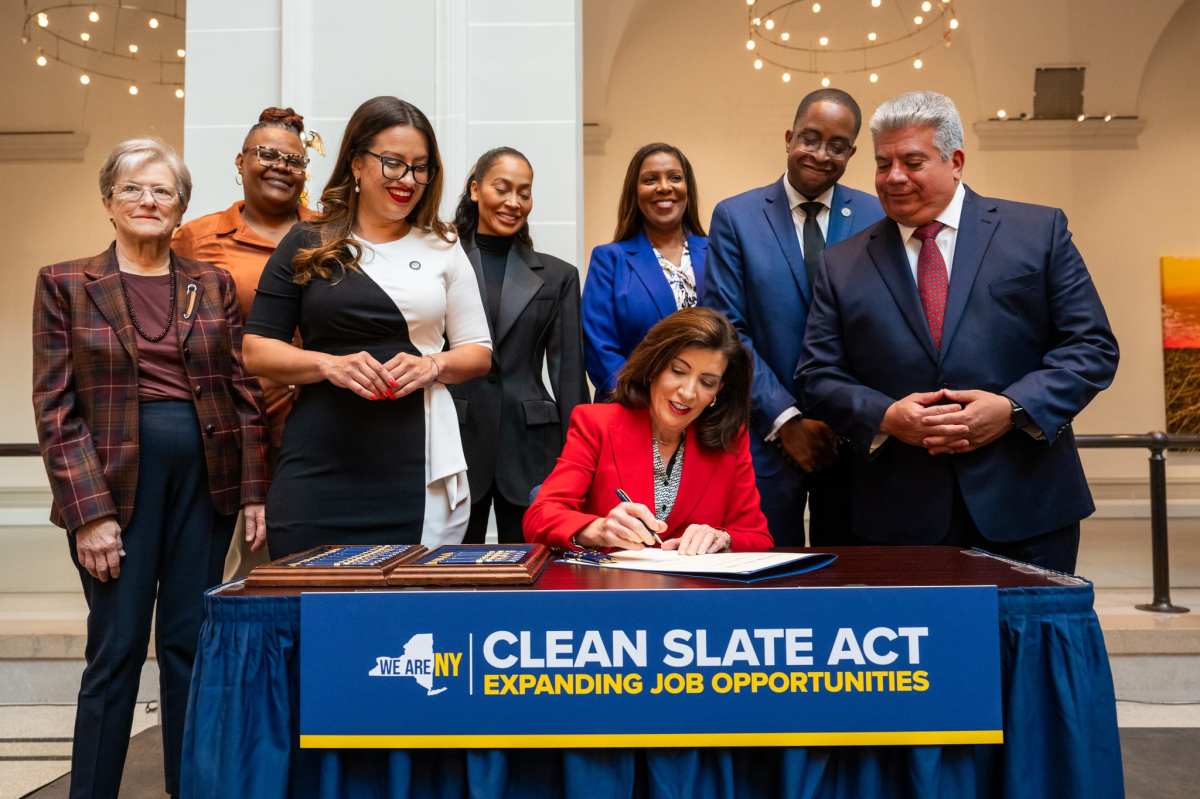Gov. Kathy Hochul signed the Clean Slate Act into law Thursday, creating a path for millions of New Yorkers to seal their criminal records and clear obstacles to housing, education, and jobs.
The Clean Slate Act, which Hochul inked into law at the Brooklyn Museum on Thursday, will automatically seal most conviction records after a waiting period, provided a person is no longer on parole and has not reoffended. Misdemeanor convictions will be sealed three years after the completion of a sentence, while eligible felonies will be sealed after eight years.
Law enforcement will still have access to the records, as will certain employers in certain jobs like those working with children. And the most serious felonies, such as murder and sex crimes, will never be eligible for sealing.
But for more than 2 million New Yorkers who have past convictions for drug offenses, theft, trespassing, fraud, or many others, the law — which takes effect in a year — will clear a substantial barrier for them to get their lives back on track years after completing their sentence. Once sealed, convictions will not appear on background checks as New Yorkers apply for jobs, housing, education, and loans, among other things.
“You only get this if you’ve turned your life around. But the good news is, millions of people have,” Hochul said on Thursday. “We seal the records, they can look for a job, learn a trade, without having that permanent scarlet letter on their forehead.”
That scarlet letter has particularly impacted the state’s Black and brown communities; some 80% of New York City residents with conviction records are Black or Latino, according to the Data Collaborative for Justice.
Melinda Agnew, of Syracuse, pleaded guilty to misdemeanor assault in 1999 when she was a young adult, and was sentenced to three years probation. More than two decades later, after becoming a mom and grandma and obtaining a master’s degree, she still finds herself answering for something she did in a past life when looking for a job or an apartment.
“The signing of the Clean Slate Act is transformative for me and millions of New Yorkers who share my struggle,” Agnew, who had lobbied for the bill’s passage with the Center for Community Alternatives, said on Thursday. “Twenty-five years later, despite all that I have done to give back to my community, I am still turned away from jobs, denied promotions, and rejected from housing programs because of my two-decade-old conviction.”
Hochul on Thursday argued the bill would also help reduce crime by reducing recidivism, namely by opening up opportunities that have long been denied to the formerly incarcerated.
“We’re not gonna continue to judge people by their worst moments in life when they’ve paid their debt,” she said. “We’ve waited too long to rectify this.”
The governor also contended the bill would help ameliorate a labor shortage in the state, and that underemployment associated with conviction records costs the state’s economy billions of dollars every year.
Republican pushback
Clean Slate has been a long-term goal for criminal justice reformers, and this year, they assembled a broad coalition of supporters in activism, business, labor, and even some law enforcement officials. The bill passed both houses of the State Legislature this year, with mostly Democrats in support and mostly Republicans in opposition.
The bills that passed had been scaled down from previous versions to gain the support of Hochul, who secured a relatively thin victory in the governor’s race last year against Republican Lee Zeldin, who made crime the centerpiece of his campaign. The final bill that passed included concessions like extending the waiting period for felonies to be sealed.
Still, the concessions have not stopped the criticism from Republicans and members of law enforcement. Suffolk County District Attorney Ray Tierney said in a New York Post op-ed that Clean Slate is a “dangerous bill” that “fails to give any consideration to the rights and interests of crime victims.”
“For a Governor who claims that her number one priority is protecting the people of New York, she sure has a funny way of showing it,” said the state Assembly’s Republican leader Will Barclay. “We all believe in second chances, but unilaterally sealing criminal records is hardly the way to go about it. The bill prioritizes those who have broken the law while once again disregarding the victims impacted by their actions.”
Nonetheless, speakers at the Brooklyn Museum praised the governor for signing the bill despite knowing it would lead to political backlash.
“What are we to tell these New Yorkers who have served their time, who have paid their debt, who are back in our communities right now,” said State Sen. Zellnor Myrie, the bill’s sponsor in Albany’s upper chamber. “We must, with the stroke of the governor’s pen, restore hope to them today.”
Read more: Shelter Mandate Changes Face Growing Public Opposition


































